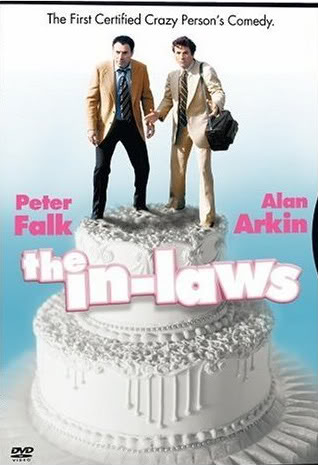
THE IN-LAWS
US, 1979, 105 minutes, Colour.
Peter Falk, Alan Arkin, Richard Libertini, Michael Lembeck, Paul L. Smith, Ed Begley Jr, James Hong.
Directed by Arthur Hiller.
The In- Laws is a black comedy, a film about American paranoia in the 1970s – especially with ordinary citizens caught up in international plots and fearing pursuit. One of the characters is a spy, the other is an ordinary citizen, a dentist – and their children are marrying. The dentist somehow or other gets caught up in all kinds of espionage mix-ups. Peter Falk and Alan Arkin are very good in the central roles.
The film was written by Andrew Bergman (Honeymoon in Vegas, Striptease) and directed by veteran Arthur Hiller, who directed a whole range of genre films over many decades including Love Story.
The film was remade in 2003 with Michael Douglas as the parent who is the agent and Albert Brooks, an expert in always seeming comically morose, as the other parent. It is a wacky comedy.
1. A successful comedy? Its appeal to American audiences, the universal audience?
2. The exaggerated themes? The conventions of black and whacky comedy? unexpected? the tone of black comedy and its satire, insight? The American tone of this exaggerated whacky comedy? The American sense of humour?
3. The presentation of ordinary citizens trying to cope with American madness in the seventies? The ordinary way of life and profession, marriage? The background of crime, robberies? The background of international espionage, the C.I.A. and deals? Cover-ups and their revelation? The extension of American involvement into Central America? How well did the screenplay blend these themes for mad comedy, satire? The overtones of violence and the eruption of madness within ordinary situations?
4. Insight into the United States, international organizations like the C.I.A., questions of foreign aid, economic situations and inflation, Latin America and its dictators, plots, the seriocomic tone of the satire and its reference to politics?
5. The presentation of the United States and its ordinariness, New York, dentists, suburban homes? The contrast with Central America? The editing and pace and the humorous effects of the contrasts? The special effects especially the car chases, the shooting etc.? The atmosphere of the jaunty score?
6. The tone of the opening and the initial elaborate robbery? The hiding of the plates? The various groups involved? The banks? The intricacy of the plots and the selling of the plates?
7. The background of the C.I.A., Sheldon's phone calls, Barry and his information, the sudden rescue and invasion by the C.I.A., the ending? The presentation of the agency and its agents?
8. The background of Central American Republics ? the Chinese pilots, assassinations, the C.I.A., the chases in the city, the general and his administration, the comedy with his hand as the puppet, his flag, medal, art collection? The final meal and the firing squad? The satire on the Woody Allen type of Banana Republic?
9. The background of the wedding in the light of Vince and his robbery and hiding of the plates, his style? Sheldon and his dentist's work and career, his home, the build-up to the meeting of the in-laws, the beginning of the stories and the exaggerations, the friendship, the clashes? The ironic interaction between the two fathers-in-law?
10. The background of Sheldon and his dental work, the lady and her teeth and her waiting? Vince's casual request and its consequences?
11. Sheldon and the robbing of the safe, the chase, his continued fear, the irony of his wife finding the plate and going to the bank, his inability to go home, the car chase, the painting of his car? The reliance on Vince and its leading to the flight in the Chinese plane, freeway chase, the crash through the market? The shooting at the airport? The effect of these madcap adventures and the ordinary dentist suddenly involved in them all? The appeal of the comedy?
12. The contrast with the young couple and the preparations for their marriage, their discussions, psychology, attitudes towards their parents? The two wives and their getting on well and the preparations for the wedding?
13. The verbal humour, the visuals, the satire, the zany style?
14. The bond between Vince and Sheldon? A mixture of clash and hatred, the gradual reliance on the other? Allan Arkin's deadpan style and growing continually manic and accepting the impossible? Peter Falk and his sweet reasonableness in the face of everything?
15. The irony of the finale, the money deal and their making millions, the happy ending at the expense of the government? Barry's sudden arrival and their coping with it?
16. The film working on the comic level as a funny story with funny characters and incidents? Audiences identifying with this? The implications in the plot? The critique of American styles and values?